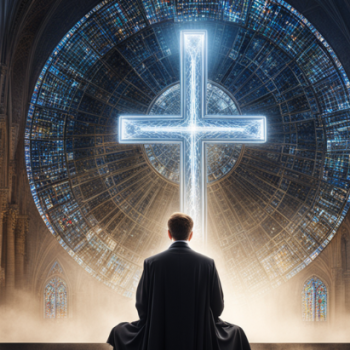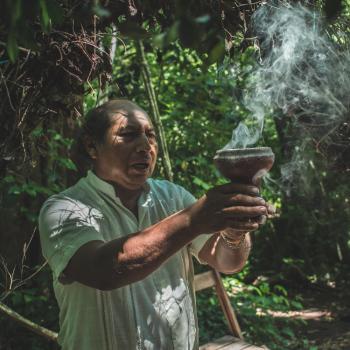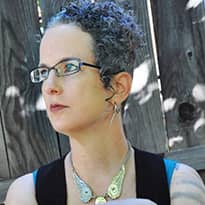
Souls governed by the nature of the universe, leading lives according to their own personal nature and using the powers of nature, should perform their worship in a manner adapted to nature and to the corporeal things moved by nature . . .
Other souls, living according to the Nous alone and the life of the Nous, and liberated from the bonds of nature, should concern themselves in all parts of theurgy with the intellectual and incorporeal law of the hieratic art.
Other souls, the media between these, should labor along different paths of holiness according to the differences of their intermediate position . . ." ~ Iamblichus from De Mysteriis as translated by Gregory Shaw
We are at a juncture, those of us known variatively as magic workers, Pagans, Esotericists or, if we want to get old school about it, The Occult. The world needs us. It needs our non-transcendent celebration of the body of the earth, the bodies of plants and animals, the bodies of humans, and the body of the cosmos itself. It needs the concept of immanent deity and the thought that we, too, can become divine.
Why? Because disconnection runs rampant and anything that strives to re-connect us, right here, right now, has got to be of help.
As a consequence of these states of disconnection -- and a deep abiding wish to connect oneself with the sacred, here and now -- the numbers of those interested in Paganism, Heathenism, Witchcraft, Wicca, Ceremonial Magick, Thelema, and any other stripe of magically tinged practice you can name, has been increasing almost exponentially. Naturally, this causes great tension among practitioners of forms that have aspects of the Mystery Religion about them.
The hallmarks of these religions are often those of initiations, and this is where so much current tension arises. One simply cannot take large numbers of people through singular, often elaborate, rites. So are these people to be given no aid, no training, and no place to worship in community? Or alternatively, are we to water down our teachings so those who don't want to work very hard can still have access?
There has to be a middle road. Hence the quote from the great Iamblichus that began this essay. Iamblichus, arguably a member of a Mystery Religion himself, and certainly a chronicler, correspondent, philosopher, and practitioner of the arts of magic and worship, states that each soul has its own work to do. Each soul must not only find the God it best relates and responds to, in order to do Divine work here on earth, but each soul has a particular function in the right running of the cosmos. Can we not say the same?
The ancient Pagans and magic workers to whom we look for teaching and inspiration never sought to impart initiation to all. Instead, some were initiates, some argued philosophy or studied math and science, still others created art, and still more fished, farmed, and tended the hearth. Everyone was granted the ability to light the flame, say the prayers, and make the offerings. Everyone was allowed the ability to find relationship as they best saw fit. Not everyone walked the corridors of darkness, deep into the earth, or out onto the astral toward the sun. Only a few trod those pathways. And that was acceptable.
It might behoove us to open up our ideas of priesthood. Not everyone need go through the same initiation. The hierarchy of current initiatory systems only works for a few people. Why? Because the mystery of their particular service, creative spark, or connection to the Gods is not served by the rituals that exist. Those rituals are most often rituals to help people lead covens, or teach a certain pathway of magical practice, or marry a particular set of Deity forms, or often, to pass on that particular initiation.
What about the priest who whispers to the plants in the garden at midnight or dawn, and is initiated by the fecund powers of the earth and the effects of the moon and sun? What about the priestess who is the weaver of fine cloth and who ministers to us all through the mystery that flows together on her loom? What about the priestess who serves as a paramedic, doctor, or nurse? Or the priest who cares for children or the dying? All of these are sacred acts with their own trials and rites of passage. Each of these has a power that I cannot begin to understand. When did we cease to "labor along different paths of holiness" in order to best serve our own souls, our own Gods, our own communities? When did we begin to believe the lie that equality means equivalency? My theory is that because we come from broken traditions, we forget the householders and physicians and set our sights only at those who sat on the high seat or made the sacrifices for the community. We forget that every person had a different role to play and that this helped to keep the community healthy and strong.





